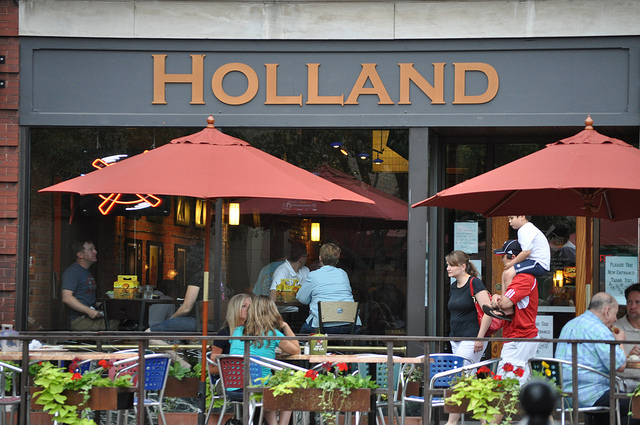In praise of place: A small town isn’t a backwater, and Holland is a marvel
On the first day of classes I ask students where they are from. They usually answer eagerly, but there are two exceptions – students who come from small towns, and students who come from the Holland-Zeeland area. Their diffidence is unjustified.
In the former instance the student will comment they are either “from nowhere” or “just a small town.” I quickly point out there is no such place as nowhere, and that wherever they are from is a somewhere, a place where for generations people have worked, lived, loved and died. Likewise, I gently rebuke small-town students for implying that their places are somehow less valuable than large cities.
Students from the Holland-Zeeland area seem especially apologetic, indicating that attending Hope bespeaks a lack of either imagination or adventure on their part. It is, in their parlance, a bubble.
But every place is a bubble in its own way. Having lived 10 years in Washington D.C., I can assure you it is very much a bubble. A larger one than the Holland-Zeeland one, to be sure, but a bubble it is. There is no city whose bubble is more self-inflated than New York’s (as in Saul Steinberg’s classic map of how New Yorkers perceive America).
Nothing is gained by suggesting that some places are bubbles and others aren’t, or by believing that some bubbles are inherently better than others. A person ought to be proud of his or her place. While each town is different, they all speak to the universal human need for belonging, for finding meaningful work, for discerning right and wrong, and for creating sound social structures.
Conservatives celebrate variety. They are suspicious of attempts to make social life uniform. The great threats to the distinctiveness of place have been large-scale capitalist economies, political centralization, mass education and its bastard spawn of hypermobility, and progressive ideology. The powerful interweaving of these four social movements with each other has created an America increasingly devoid of distinctions.
These places are in their own ways organic wholes, not merely parts. To disintegrate one aspect of a place is to threaten its overall health. Of course, they are not static: like any organism they have cycles of growth and decay, with the determinant elements being largely human will and effort.
But they are not to be disparaged as cracker-laden flyover zones, or as benighted backwaters of lost opportunity that talented young persons would do well to leave. Indeed, they became places worthy of respect in the first place because of the commitment of ambitious, talented, and creative individuals.
Holland stands as a fine example of this, as demonstrated in Robert Swierenga’s breathtakingly comprehensive 3-volume history of the city. Swierenga presents with marvelous detail the history of the city by organizing along topical lines – business, industry, education, and so forth – then by particulars, and then chronologically within those particulars.
It is microhistory: there isn’t a grand narrative holding it all together, but from the particulars emerges a history whose central characteristics are risk-taking, hard work and creative intelligence.
Like many places in America, Holland was founded by people who were busy looking for someplace else. But once they settled, they were determined to make something of it. Holland’s “founder,” Albertus C. VanRaalte, in Swierenga’s account, combined visionary leadership with a keen appetite for land acquisition. He embodied, in many ways, the complexity of human beings, where religious devotion and economic acquisitiveness co-exist: not always comfortably, but often symbiotically.
In that sense, the city is much like its founder – deeply religious, and also economically successful. One telling chapter in Swierenga’s book tells the complicated story of the history of Donnelly Mirrors, a successful company run by people who genuinely cared for their workers. It’s an inspiring story of economic acuity and religious sensibility. It’s little wonder that when Hope College hired a new president it pegged a man who had authored the book “How the Church Fails Businesspeople (And What Can Be Done About It).”
Throw a dart at a map of Michigan and you’ll find community after community that has its own story born of such commitments. It takes generations to build these places, but they can be destroyed in one, unless those that are raised there seek their preservation. Lord knows no one else will.
See what new members are saying about why they donated to Bridge Michigan:
- “In order for this information to be accurate and unbiased it must be underwritten by its readers, not by special interests.” - Larry S.
- “Not many other media sources report on the topics Bridge does.” - Susan B.
- “Your journalism is outstanding and rare these days.” - Mark S.
If you want to ensure the future of nonpartisan, nonprofit Michigan journalism, please become a member today. You, too, will be asked why you donated and maybe we'll feature your quote next time!


 Why be shy of saying you’re from a place like Holland? It’s not New York, but its story is as moving and important as any. (Photo by Flickr user Michigan Municipal League; used under Creative Commons license)
Why be shy of saying you’re from a place like Holland? It’s not New York, but its story is as moving and important as any. (Photo by Flickr user Michigan Municipal League; used under Creative Commons license)